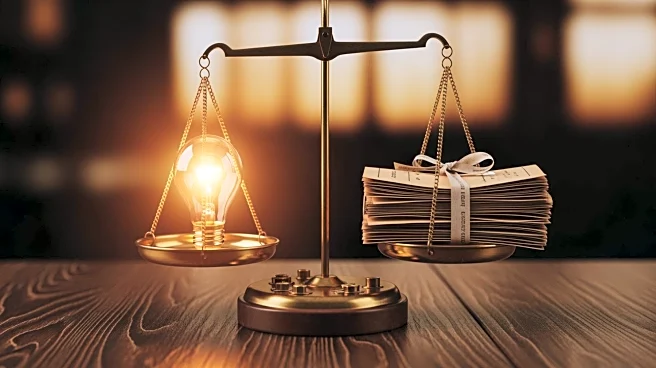What's Happening?
Sark Electricity Limited (SEL) has requested a 40p increase in power prices on the island, raising the cost per unit from 52p to 92p. This request follows a previous halving of prices after the regulator
deemed them unfair. The proposed increase aims to recover unpaid legal levies incurred during SEL's legal battles over compulsory purchase plans. Many residents have refused to pay these levies, leading to a contentious situation. The island's government, Chief Pleas, voted to compulsorily purchase SEL earlier this year, citing outdated and dangerous infrastructure. Plans are underway to upgrade the grid and introduce renewable energy sources, with estimated costs around £8.6 million.
Why It's Important?
The proposed price increase highlights the financial and legal challenges faced by small utility companies like SEL. The situation underscores the complexities of managing energy infrastructure in isolated communities, where legal disputes can significantly impact consumer costs. The compulsory purchase and planned upgrades reflect a push towards modernizing energy systems and incorporating renewable sources, which could set a precedent for similar communities. However, the financial burden on residents and the contentious nature of the legal levies raise concerns about fairness and transparency in utility management.
What's Next?
The Sark government is moving forward with the compulsory purchase of SEL, with a court hearing to appoint a valuer scheduled. This process will determine the future ownership and management of the island's electricity infrastructure. As plans for grid upgrades and renewable energy integration progress, residents and local authorities will need to navigate the financial implications and potential benefits. The outcome of the legal proceedings and infrastructure developments will shape the island's energy landscape and could influence similar initiatives in other regions.
Beyond the Headlines
The situation in Sark reflects broader issues of energy management and sustainability in small communities. The push for renewable energy and modern infrastructure aligns with global trends towards sustainable development. However, the legal and financial challenges highlight the need for careful planning and community engagement to ensure equitable solutions. The case also raises questions about the role of government intervention in utility management and the balance between public and private interests.









